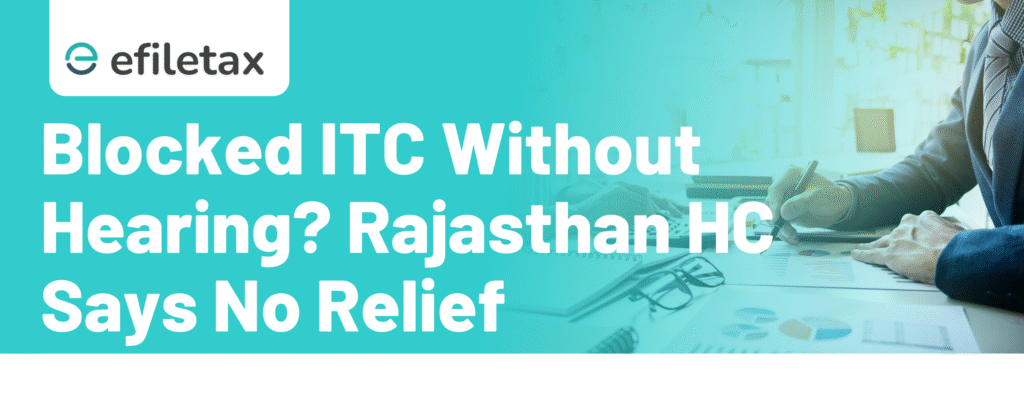
ECRL of ITC Blocked without Hearing: What the Rajasthan HC Said
Blocked ITC via ECRL without hearing the taxpayer? That may not hold water under GST law. In a recent case, the Rajasthan High Court refused to intervene, but also noted that blocking Input Tax Credit (ITC) via Electronic Credit Reversal Ledger (ECRL) without granting the taxpayer an opportunity of hearing raises serious concerns around natural justice.
Let’s break down what this means for taxpayers and what the law says.
What is ECRL and Why ITC Blocking Matters
ECRL (Electronic Credit Reversal Ledger) is a backend tool used by GST officers to reverse ITC claimed by the taxpayer.
However, using it without notice or hearing can:
- Violate Section 75(4) of the CGST Act, 2017
- Breach principles laid down in SC judgments like Dharampal Satyapal Ltd.
- Undermine the taxpayer’s right to be heard
Key Takeaways from the Rajasthan HC Case
- Case: M/s Saurabh Agrotech v. UoI & Ors.
- Issue: ITC blocked using ECRL without show cause notice or opportunity of hearing
- HC View:
- Dismissed the petition on technical grounds
- Noted that proper remedy lies in appeal under Section 107
- But also did not approve of action taken without hearing
Implication: Though the court didn’t interfere, it hinted that the department must follow due process when using ECRL to block ITC.
Relevant Legal Provision: Section 75(4)
“An opportunity of hearing shall be granted where a request is received or adverse decision is contemplated…”
Blocking ITC using backend tools like ECRL without a formal notice or adjudication contravenes this section.
ITC Blocking: What CBDT and CBIC Say
While there’s no separate notification for ECRL usage, the CBIC Instruction No. 01/2022-GST guides field officers to adopt a cautious and documented approach when invoking ITC blocking.
Further, multiple courts (Punjab & Haryana, Madras) have ruled that:
- ITC is a vested right under Section 16
- Can’t be reversed arbitrarily without proper adjudication
Expert View: Challenge Before Commissioner (Appeals)
If your ITC is blocked through ECRL without intimation:
- File an appeal under Section 107
- Highlight the breach of natural justice
- Request restoration of credit pending adjudication
🧠 Pro Tip: Attach copies of 2–3 High Court orders from other jurisdictions where courts held ITC can’t be reversed without SCN. This builds pressure on the appellate authority.
Comparison: ITC Blocking with vs without Hearing
| Criteria | With Hearing | Without Hearing |
|---|---|---|
| Legal Validity | Generally upheld | Often struck down |
| Taxpayer Recourse | Limited | Strong grounds to appeal |
| Departmental Protection | Stronger (recorded SCN) | Weak (ex-parte action) |
| Court’s Approach | Procedural compliance | Violation of natural justice |
Action Steps for Taxpayers
- Check GST portal for changes in ITC balance
- Seek reasons from officer if credit is reduced
- File written representation demanding hearing
- Appeal under Section 107 if no response
- Consult a GST practitioner or CA to frame your argument on violation of natural justice
Final Thoughts
While the Rajasthan High Court did not intervene directly, the message is clear — tax officers can’t use ECRL to reverse your ITC without a hearing. Natural justice remains a core pillar of tax adjudication, even in the GST regime.
If your ITC has been blocked without notice or opportunity of reply, don’t stay silent. File an appeal, assert your rights — and let Efiletax assist you in the process.
FAQ on ECRL and ITC Blocking
Q1. Can ITC be blocked without any notice?
No. Section 75(4) mandates that taxpayers must be heard before an adverse decision.
Q2. What is ECRL under GST?
It is the Electronic Credit Reversal Ledger, a system tool used to reduce or reverse ITC.
Q3. What is the remedy if ITC is reversed without hearing?
You can file an appeal under Section 107 of the CGST Act, 2017.
Summary
ECRL of ITC blocked without hearing? Rajasthan HC in Saurabh Agrotech’s case refused relief but hinted such action violates natural justice under Section 75(4). File appeal under Section 107 to contest it.